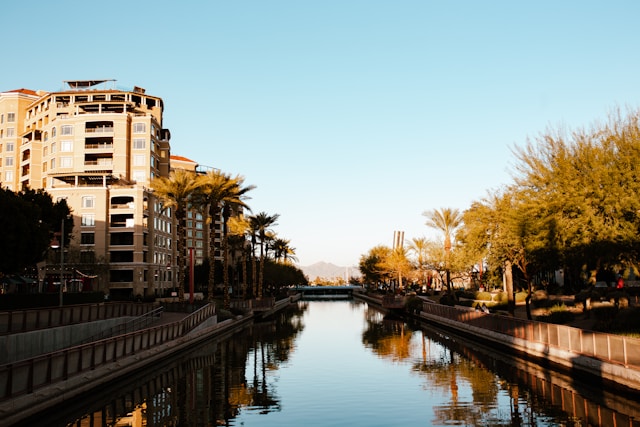Scottsdale, AZ, known for its vibrant nightlife, upscale restaurants, and luxury resorts, has become a popular destination for tourists and business travelers alike. As the demand for short-term rentals (commonly referred to as Airbnb properties) grows, so does the need for clear and comprehensive regulations.
This blog post will delve into the specifics of short-term rental regulations in Scottsdale, AZ, providing you with all the information you need to operate legally and successfully in this thriving market.
Understanding Short-Term Rentals in Scottsdale
Short-term rentals, often synonymous with Airbnb properties, are defined as residential properties rented out for periods of less than 30 days. These rentals offer visitors a home-like experience and provide homeowners with an opportunity to generate additional income. However, the rise in popularity of short-term rentals has led to concerns regarding noise, safety, and community disruption, prompting local governments to establish regulations.
Scottsdale’s Regulatory Framework for Short-Term Rentals
Licensing and Registration
In Scottsdale, property owners who wish to operate short-term rentals must obtain a Transaction Privilege Tax (TPT) license from the Arizona Department of Revenue. This license is essential for collecting and remitting state and local taxes on rental income. Additionally, Scottsdale requires all short-term rental operators to register their properties with the city. This registration process involves providing contact information, proof of ownership, and details about the property.
Zoning and Land Use
Scottsdale’s zoning laws play a crucial role in determining where short-term rentals can operate. While there are no specific zoning districts exclusively for short-term rentals, properties in residential zones are subject to stricter scrutiny. It is essential for Airbnb hosts to verify that their property complies with local zoning laws and does not violate any homeowner association (HOA) rules, as these can override city regulations.
Top 100 Airbnb Rental Markets

Instantly compare the top 100 short-term (Airbnb) rental markets in the US
Health and Safety Standards
To ensure the safety and well-being of guests, Scottsdale has implemented several health and safety standards for short-term rentals. These include:
- Smoke Detectors and Carbon Monoxide Alarms: Properties must be equipped with functioning smoke detectors and carbon monoxide alarms.
- Fire Extinguishers: A fire extinguisher must be readily accessible in the property.
- Emergency Contact Information: Hosts must provide guests with emergency contact information and a local contact person who can respond to issues within an hour.
- Occupancy Limits: Short-term rentals must adhere to occupancy limits based on the size of the property and the number of bedrooms.
Noise and Nuisance Regulations
Scottsdale enforces strict noise and nuisance regulations to maintain community harmony. Short-term rental operators are required to inform guests about these regulations and ensure compliance. Key points include:
- Quiet Hours: Noises must be kept to a minimum between 10 PM and 7 AM.
- Parties and Events: Large parties and events are generally prohibited in short-term rentals.
- Parking: Adequate parking must be provided, and guests should be instructed to park in designated areas only.
Taxation
Airbnb hosts in Scottsdale must collect and remit state, county, and city taxes on rental income. This includes the Transaction Privilege Tax (TPT) and the transient lodging tax. Failure to comply with tax obligations can result in penalties and interest charges.
Enforcement and Penalties
Scottsdale has established a robust enforcement mechanism to ensure compliance with short-term rental regulations. The city employs a combination of proactive inspections and complaint-driven investigations. Common violations include operating without a license, exceeding occupancy limits, and failing to maintain safety standards.
Penalties for non-compliance can be severe, ranging from fines to the suspension or revocation of the rental license. Repeated violations can result in escalating penalties and potential legal action.
Resources for Scottsdale Short-Term Rental Operators
Operating a short-term rental in Scottsdale requires a thorough understanding of local regulations and compliance requirements. Here are some essential resources:
- Arizona Department of Revenue: Provides information on obtaining a Transaction Privilege Tax (TPT) license and remitting taxes. Arizona Department of Revenue
- City of Scottsdale Official Website: Offers detailed information on short-term rental registration, zoning laws, and health and safety standards. City of Scottsdale
- Scottsdale Short-Term Rental Guide: A comprehensive guide that covers all aspects of operating a short-term rental in Scottsdale. Scottsdale Short-Term Rental Guide
- Homeowner Associations (HOAs): Check with your local HOA for specific rules and restrictions that may apply to short-term rentals in your community.
Conclusion
Navigating the regulatory landscape for short-term rentals in Scottsdale, AZ, can be challenging, but it is essential for maintaining a successful and compliant operation. By understanding and adhering to local licensing, zoning, health and safety, noise, and tax regulations, Airbnb hosts can provide a safe and enjoyable experience for their guests while contributing positively to the community.
Whether you are a seasoned short-term rental operator or just starting, staying informed and proactive about local regulations is key to your success. Utilize the resources provided, maintain open communication with city officials, and always prioritize the safety and comfort of your guests.


